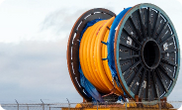Everything You Need To Know About EMT Electrical Conduit

EMT electrical conduit is one of the most popular types of conduit on the market in the lightweight category. In this post, we review applications of EMT conduit, list its pros and cons, and look into how EMT conduit compares with other popular types of conduit on the market.
What is EMT electrical conduit?
EMT is the term that stands for electric metallic tubing. This is the most popular type of electrical conduit used in cable installations. EMT is commonly referred to as a thin-wall conduit because its walls are significantly thinner compared to RMC, or rigid wall conduit, another popular type of conduit. EMT conduit is galvanized to provide resistance to rust and corrosion.
Applications of EMT Conduit
When it comes to applications, EMT is a versatile type of conduit. Here are the key characteristics of EMT conduit and applications associated with them:
- Suitable for exposed and concealed applications
- Rated for indoors and outdoors
- Works in both wet and dry conditions
- Available for direct burial
- Permitted to use as an equipment grounding conductor as per NEMA 250.118
- Permitted to be embedded in concrete
- Perfect for commercial, industrial, and residential applications where not much physical damage is expected.
- Can be used in overhead lighting circuits
- Used in retrofitting and remodeling projects for rerouting of cabling because of flexibility
Advantages of EMT Conduit
EMT has many benefits as a light and widely available conduit.
- EMT conduit is lightweight, flexible, and easy to bend
- EMT fittings are available everywhere and are relatively easy. Set-screw or compression-type fittings are an option.
- A safe solution for fire-rated enclosures because it is non-flammable
- EMT conduits are aesthetically more attractive than others, such as PVC, making them excellent for exposed environments where appearance matters.
Limitations of EMT Conduit
Though EMT conduit is rather versatile, its structure comes with several limitations:
- As a thin-wall conduit, EMT cannot be used where physical damage is a strong possibility.
- Raintight electrical metallic tubing (EMT) fittings are not currently available on the market.
- While possessing excellent moisture resistance, the EMT conduit is not watertight, so it cannot be submerged in water.
Aluminum vs. Steel EMT Conduit
On the market, EMT conduit is available in aluminum and steel options, each sharing common characteristics but with unique pros and cons. Here is a comparison of both:
- While both are relatively lightweight, the EMT conduit is lighter than steel.
- Both aluminum and steel are corrosion-resistant, but steel has to be galvanized to offer comparable corrosion resistance.
- Steel EMT conduit is more sturdy and rigid compared to aluminum EMT conduit.
- Galvanized steel EMT is generally cheaper compared to aluminum EMT, though prices are comparable.
EMT vs. Rigid Conduit
EMT is often juxtaposed with rigid conduit or RMC. Let's look into the differences between the two. RMC is a thick-wall heavy-duty conduit made of galvanized steel, while
- Unlike EMT, the rigid conduit is made of thick-wall metal.
- EMT is much easier to cut and install compared to rigid conduit
- RMC has far superior protection against mechanical impact
- Galvanized rigid conduit has superior resistance to corrosion
- RMC is much more common in industrial settings due to corrosion and mechanical impact resistance.
EMT Conduit vs. PVC
Another type of conduit that PVC is often getting compared to is PVC. Here is how they differ:
- PVC is a plastic conduit not made of any metal
- PVC conduit is not rigid at all and can only be bent when heated
- PVC conduit often has to be glued during indoor installation
- PVC is not permitted to serve as an equipment grounding conductor, unlike EMT
- PVC and EMT are used outdoors and underground, but EMT is more common indoors.
- PVC conduit is cheaper than EMT


















